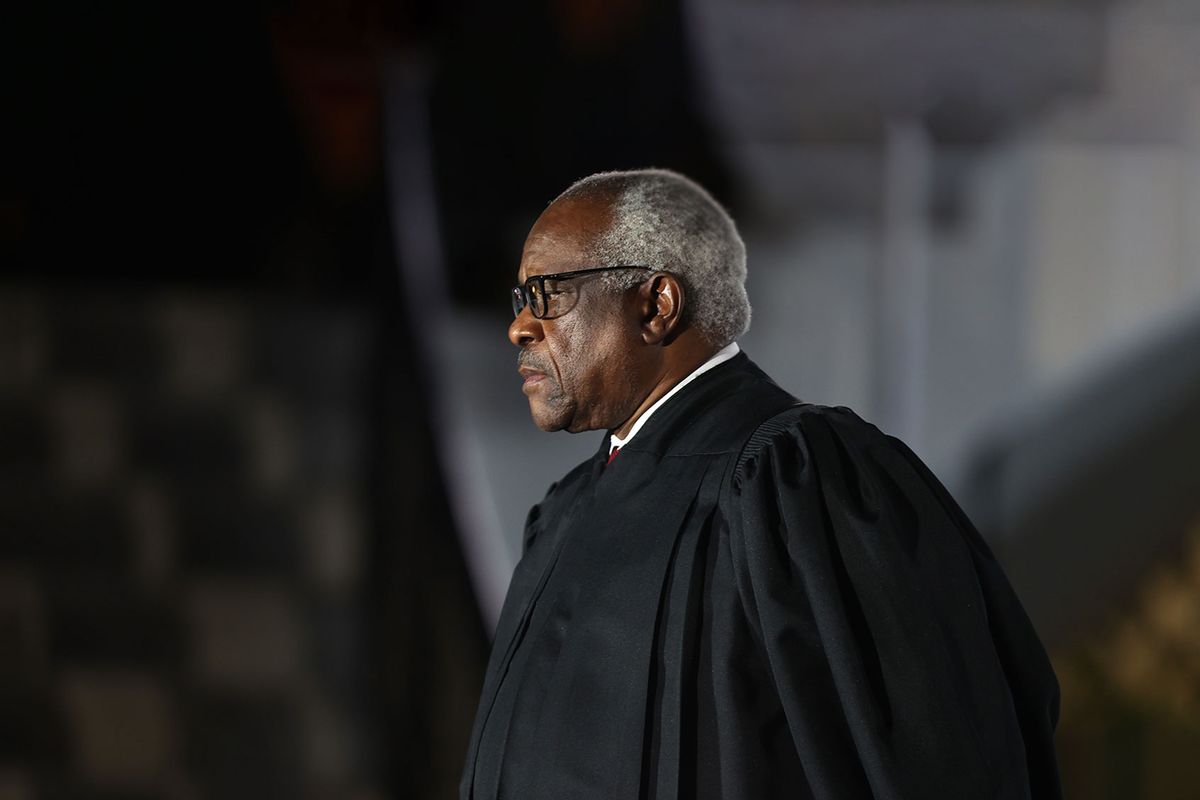A report published Monday highlights potential connections between the political influence of Harlan Crow's family and the billionaire GOP megadonor's yearslong endeavor to shower U.S. Supreme Court Justice Clarence Thomas with lavish vacations and other undisclosed gifts.
Since Thomas provided a deciding vote in the 2010 Citizens United v. Federal Election Commission case, the Crow family's ability to influence federal elections has increased by a factor of almost nine, according to an Americans for Tax Fairness (ATF) analysis of campaign finance data.
In "Travel Rewards: What the Crow Family May Have Bought by Hosting Those Luxury Trips for Justice Thomas," ATF shows how Thomas' vote in the 5-4 decision that effectively legalized unlimited political spending has allowed the Crows to increase their average annual campaign contributions by 862%, from $163,241 pre-Citizens United to $1.57 million post-ruling.
While Thomas and Crow have denied any impropriety, recent revelations about their relationship have fueled fresh calls for the conservative justice to resign or face impeachment proceedings.
"The Crows used their fortune to buy access to and curry favor with one of the most powerful officials in Washington, then benefited from his central role in loosening rules meant to limit the influence of money over politics and policy," said ATF executive director David Kass.
"It's a vicious cycle that can only be short-circuited by restoring meaningful campaign finance rules and by demanding a much fairer share of taxes from billionaires, which, among other good results, will leave them less money to distort our democratic process," Kass added.
"The Crows' influence-buying and political spending are emblematic of a larger problem: the ongoing attempt by billionaires to purchase our democracy."
As ATF notes, the Crow family (Harlan, his wife, parents, siblings, and their family-owned businesses) has used its $2.5 billion fortune to influence elections for the past half-century.
But of the $25.8 million dollars the Crows donated to mostly GOP candidates from 1977 to 2022, $20.5 million (almost 80%) came in the 12 years after Thomas joined his fellow right-wing jurists in gutting campaign finance laws, the analysis points out.
ATF argues that "the Crows' influence-buying and political spending are emblematic of a larger problem: the ongoing attempt by billionaires to purchase our democracy."
In a report published last summer, the group documented how "billionaires are increasingly using their personal fortunes and the profits of connected corporations to drown out regular voters' voices and elect hand-picked candidates who further rig the nation's economy—especially the tax system."
Not counting dark money contributions, billionaires dumped $1.2 billion into the 2020 elections, 65 times more than the $16 million they donated in 2008, the report found. By last June, a few dozen billionaires had already pumped tens of millions of dollars into the 2022 midterms—mostly to support Republican candidates, including several election deniers—in a bid to ensure that Congress is full of lawmakers willing "to make their wealthy benefactors even richer."
"Billionaires shouldn't be able to buy political access and influence with their enormous fortunes," ATF tweeted Monday. "It's well beyond time for Citizens United to go, and to put real action towards making billionaires pay their fair share in taxes. Our democracy depends on it."
"It's well beyond time for Citizens United to go, and to put real action towards making billionaires pay their fair share in taxes. Our democracy depends on it."
In addition to benefiting from the Citizens United decision that has increased wealthy Americans' ability to shape electoral outcomes, Crow has connections to right-wing groups involved in Supreme Court cases since Thomas was first confirmed to the bench in 1991.
Crow's financial ties to Thomas, which the jurist failed to disclose and only came to light last month thanks to investigative reporting by ProPublica, go beyond decades of all-expenses-paid trips valued at hundreds of thousands of dollars.
For instance, four years after Thomas helped deliver a victory to U.S. oligarchs in Citizens United, Crow purchased a property owned by Thomas for $130,000 and made improvements to it while the judge's mother continued to live there.
Thomas is not alone when it comes to conflicts of interest on the high court. Last week, Politico revealed that just days after his April 2017 confirmation, Justice Neil Gorsuch and his business partners sold a 40-acre Colorado ranch for almost $2 million to an undisclosed person. The buyer, Brian Duffy, is the CEO of a law firm that has since been involved in 22 cases before the court.
Despite growing evidence of possible corruption, Chief Justice John Roberts has refused to accept an invitation to testify at an upcoming Senate Judiciary Committee hearing on potential reforms to the Supreme Court, which is currently controlled by six far-right justices, most of whom were appointed by Republican presidents who lost the popular vote.
Progressives have demanded far-reaching changes to disempower the country's "rogue" justices, including adding seats—a move that has been made seven times throughout U.S. history—and enacting robust ethics rules.
Polling data shows that public approval of the Supreme Court has declined sharply in the months since its reactionary supermajority eliminated the constitutional right to abortion care, among other harmful and unpopular decisions. According to a survey conducted in April, nearly two-thirds of U.S. adults no longer have confidence in the nation's chief judicial body.



Shares